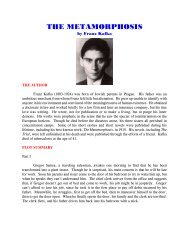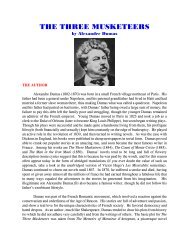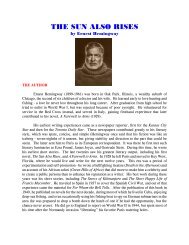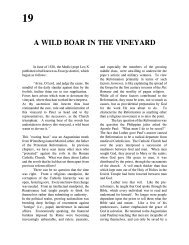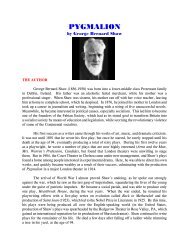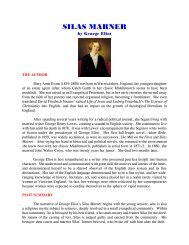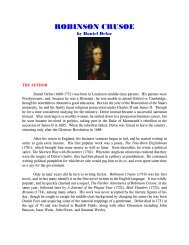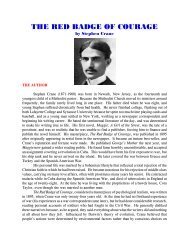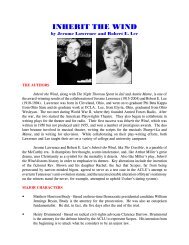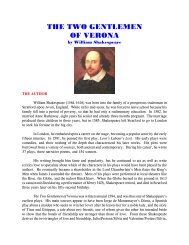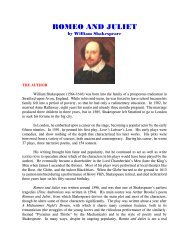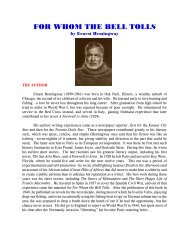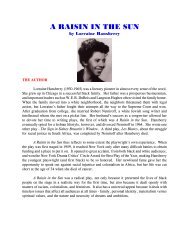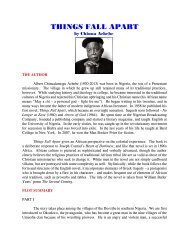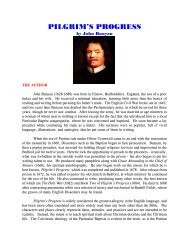WUTHERING HEIGHTS
WUTHERING HEIGHTS
WUTHERING HEIGHTS
Create successful ePaper yourself
Turn your PDF publications into a flip-book with our unique Google optimized e-Paper software.
The story, which begins in the year 1771, concerns two families, the Earnshaws, who liveat Wuthering Heights, and the Lintons, who live at nearby Thrushcross Grange. Each family hastwo children - Hindley Earnshaw and his much younger sister Catherine, and Edgar and IsabellaLinton. Early in the story, Mr. Earnshaw brings a young orphan named Heathcliff home fromLiverpool and announces that he intends to raise him as his own son. In fact, he favors Heathcliffover his own children, generating lifelong animosity between Heathcliff and Hindley. Mrs.Earnshaw soon dies, and is followed quickly by her husband, leaving Hindley master of the houseand guardian of the younger children. He quickly takes the opportunity to gain his revenge againstHeathcliff, who is treated as an outcast and servant, and kept from contact with Catherine, despitethe attachment that has developed between the two of them.Hindley marries Frances, a woman from outside the neighborhood, and they have a child,Hareton; Frances dies shortly thereafter. Meanwhile, Catherine and Heathcliff have beenspending time together in secret, and one night they sneak out across the moor to ThrushcrossGrange. While peeking in the window, Catherine is attacked by a dog and badly bitten. TheLintons invite her inside, but refuse to admit Heathcliff. Catherine spends the next five monthswith the Lintons, and learns from their society, while at the same time becoming good friends withEdgar, who is in turn smitten with the young beauty. Catherine now views Heathcliff as ignorantand degraded, and decides to marry Edgar, despite the fact that she doesn’t love him.Heathcliff storms away in a fit of anger and jealousy, and is not heard from for the nextthree years. During his years away from the moors, Heathcliff makes a fortune, and returns toexact his revenge on the Earnshaws and the Lintons. He takes up residence at Wuthering Heights,and soon takes advantage of Hindley, who, in his grief over the death of his wife, has turned toidleness, drinking, and gambling. Before long, Heathcliff controls the estate, having won it in acard game, and abuses Hindley and treats Hareton like a servant, depriving him of all educationand social graces (much as Hindley had earlier treated Heathcliff himself). Heathcliff, meanwhile,begins to visit Catherine at Thrushcross Grange, and in the process attracts the attention of Edgar’ssister Isabella. Despite the fact that Heathcliff openly professes his love for Catherine and deniesany affection for Isabella, the latter elopes with Heathcliff, against the advice of everyone in thehousehold. This leads to a major falling-out between Heathcliff and Edgar, after which Catherinebecomes ill, and dies while delivering her first child, a girl also named Catherine. Meanwhile,Heathcliff openly abuses his wife Isabella, and she finally flees the house while carrying theirchild, a weak and sickly boy named Linton Heathcliff.Isabella becomes ill and dies, first entrusting her son to Edgar, but Heathcliff soondemands the return of his son to Wuthering Heights, where he indulges his every whim whilesecretly despising his weakness. Having already gained control of Wuthering Heights, he schemesto possess Thrushcross Grange as well by marrying young Linton to Cathy, the daughter of Edgarand Catherine. Edgar becomes increasingly sickly, so Heathcliff accelerates his plot by trickingCathy into coming to Wuthering Heights to visit Linton, then keeping her a prisoner andthreatening to keep her there until after her father is dead unless she agrees to marry Linton. Shegoes through with the marriage, and her father dies shortly thereafter. Linton, having served hispurpose, is then neglected by Heathcliff, and he, too, soon dies, leaving Heathcliff the owner ofboth houses. He continues to exact his revenge by treating the surviving offspring of his enemies,Hareton and Cathy, as servants. This is the situation that Lockwood observes when he firstarrives at Wuthering Heights in 1801.
We then discover that the ghost of Catherine has been haunting Heathcliff for the lasteighteen years, driving him increasingly out of his mind. Meanwhile, Cathy and Hareton aregrowing fond of one another, and are actually finding a modicum of happiness in the miserableenvironment created by the vengeful Heathcliff. When he realizes that his plan for vengeance hasfailed, he gives up on life, and seeks only to be reunited with his beloved Catherine. He soonstops eating and dies, being laid to rest by her side, his dust mingling with hers in the grave. Thestory ends with the announcement of the engagement of Hareton and Cathy, who plan to leaveWuthering Heights and take up residence at Thrushcross Grange.MAJOR CHARACTERS• Lockwood - The narrator of the frame in which the story takes place, he is a minorcharacter who has limited contact with characters in the story during the last year of thenarrative. He thinks of himself as a social outcast, but soon learns he is not in the sameleague as Heathcliff and the other denizens of Wuthering Heights.• Ellen (Nelly) Dean - Housekeeper for the Earnshaws, she narrates most of the story underthe guise of relating it to Lockwood. She grew up with Hindley and Catherine, and atvarious times was caretaker for Hareton and Cathy.• Hindley Earnshaw - The elder of the two Earnshaw children, he rules the household afterhis father’s death, marries Frances, and becomes the father of Hareton. After his wife’sdeath, he becomes increasingly disconsolate, and ultimately loses Wuthering Heights toHeathcliff.• Catherine Earnshaw (later Linton) - Hindley’s younger sister, she is wild and free-spirited,but is somewhat tamed by her association with Edgar and Isabella Linton. She lovesHeathcliff as her own self, but refuses to marry him because of his lack of education andbreeding. Instead, she marries Edgar Linton, and dies giving birth to young Cathy. Herghost appears several times in the story.• Heathcliff - Found by Mr. Earnshaw on a trip to Liverpool, he is raised as a member ofthe family, but the favoritism shown him by his guardian alienates him from Hindley, whobecomes his sworn enemy. He is neglected and reduced to servant status by Hindley afterMr. Earnshaw’s death, but becomes Catherine’s soul-mate. After Catherine’s marriageto Edgar, he leaves for three years, makes a fortune, and returns to exact revenge on bothEarnshaw and Linton families. He marries Isabella, and in turn abuses Hindley, Hareton,Isabella, Linton, and Cathy. Meanwhile, he is haunted by the ghost of Catherine. Whenhe realizes that his plan for revenge is doomed to failure, he gives up on life, havingnothing more to live for, stops eating, and soon dies going to join his beloved Catherine.• Edgar Linton - Kind and gentle soul who wins the hand of Catherine, if not her heart,though he loves her too madly to recognize their essential incompatibility. He raises youngCathy until his own death.
• Isabella Linton - Edgar’s brother, who as a somewhat rebellious young girl falls forHeathcliff against the advice of Edgar, Catherine, and Nelly. She is abused by Heathcliffand soon leaves him, giving birth to Linton and dying a few years later.• Hareton Earnshaw - Son of Hindley and Frances, he spends most of his early years underthe harsh tutelage of Heathcliff, who despises him and wants him to grow up in ignoranceand misery. Despite this treatment, he is a young man of good character, who falls in lovewith Cathy as soon as he meets her, but is repeatedly rebuffed, though finally she growsto love him. At the end of the story they are engaged to be married.• Cathy Linton (later Heathcliff, later Earnshaw) - Daughter of Edgar and Catherine, she israised by her father after her mother dies in childbirth. She has her father’s looks and hermother’s independence of spirit. Shortly before her father’s death, she is forced byHeathcliff to marry his son Linton, who dies shortly thereafter. For the next few years,she is treated as a servant by Heathcliff. She gradually falls in love with Hareton, andmarries him after Heathcliff’s death.• Joseph - A servant at Wuthering Heights, Joseph is a grumbling, hypocritical religiousfanatic who, as the only religious character in the story, underscores its underlyingpaganism.NOTABLE QUOTATIONS“I perceive that people in these regions acquire over people in towns the value that a spiderin a dungeon does over a spider in a cottage, to their various occupants; and yet the deepenedattraction is not entirely owing to the situation of the looker-on. They do live more in earnest,more in themselves, and less in surface change, and frivolous external things. I could fancy a lovefor life here almost possible; and I was a fixed unbeliever in any love of a year’s standing. Onestate resembles setting a hungry man down to a single dish, on which he may concentrate hisentire appetite and do it justice; the other, introducing him to a table laid out by French cooks:he can perhaps extract as much enjoyment from the whole; but each part is a mere atom in hisregard and remembrance.” (Lockwood, p.55-56)“‘It is not,’ retorted she; ‘it is the best! The others were the satisfaction of my whims:and for Edgar’s sake, too, to satisfy him. This is for the sake of one who comprehends in hisperson my feelings to Edgar and myself. I cannot express it; but surely you and everybody havea notion that there is, or should be, an existence of yours beyond you. What were the use of mycreation, if I were entirely contained here? My great miseries in this world have been Heathcliff’smiseries, and I watched and felt each from the beginning: my great thought in living is himself.If all else perished, and he remained, I should still continue to be; and if all else remained, andhe were annihilated, the universe would turn to a mighty stranger: I should not seem a part of it.My love for Linton is like the foliage in the woods: time will change it, I’m well aware, as winterchanges the trees. My love for Heathcliff resembles the eternal rocks beneath: a source of littlevisible delight, but necessary. Nelly, I am Heathcliff! He’s always, always in my mind: not asa pleasure, any more than I am always a pleasure to myself, but as my own being. So don’t talkof our separation again: it is impracticable.” (Catherine, p.74-75)
“‘Afraid? No!’ he replied. ‘I have neither a fear, nor a presentiment, nor a hope of death. Whyshould I? With my hard constitution and temperate mode of living, and unperilous occupations,I ought to ,and probably shall remain above ground, till there is scarcely a black hair on my head -And yet I cannot continue in this condition! I have to remind myself to breathe - almost to remindmy heart to beat! And it is like bending back a stiff spring: it is by compulsion that I do theslightest act not prompted by one thought, and by compulsion, that I notice anything alive or dead,which is not associated with one universal idea. I have a single wish, and my whole being andfaculties are yearning to attain it. They have yearned towards it so long, and so unwaveringly,that I’m convinced it will be reached - and soon - because it has devoured my existence: I amswallowed in the anticipation of its fulfillment.’” (Heathcliff, p.296-297)ESSAY QUESTIONSDiscuss the following in a five-paragraph essay:1. Discuss the validity of the following statement: Though it was written during the VictorianEra, and though the events narrated in the novel take place during the Age of Reason,Emily Bronte’s Wuthering Heights is a Romantic novel, not in the sense of being a lovestory, but in the sense of seeking to demonstrate the power of emotion over that of reason.2. “I ... wondered how any one could ever imagine unquiet slumbers for the sleepers in thatquiet earth.” Passion leads only to death, and Hareton and Cathy choose to leave the wildatmosphere of Wuthering Heights for the more cultured environs of Thrushcross Grange.Only those untouched by society, the ignorant inhabitants of the moors, could possiblybelieve that the ghosts of Catherine and Heathcliff still wander abroad. Is WutheringHeights essentially a novel of the early Victorian era, demonstrating the ultimate triumphof society over nature? Is Emily Bronte’s great novel a sterling example of Romanticismor a critique of it?3. Discuss the view of childhood found in Emily Bronte’s Wuthering Heights. Contrary tothe glorification of childhood as an age of innocence by most of the thinkers of theRomantic Era, Emily Bronte portrays childhood as a time of violent, uncontrolled,unrealistic passion, which must ultimately be succeeded by the balanced maturity ofadulthood. Thus the only happy characters in Wuthering Heights are those who are ableto move beyond the passions of childhood, while those who fail to do so destroy not onlythemselves, but also those around them. Do you agree with this assessment? Why or whynot?4. The central characters in Wuthering Heights are strange and wild, and thus alien to thetypical reading audience, but Emily Bronte uses the character of the narrator, Lockwood,to bridge the gap between her characters and her readers. Evaluate the effectiveness of thistechnique.
5. Is the ghost of Catherine, which appears to Lockwood near the beginning of EmilyBronte’s Wuthering Heights and later in various circumstances to Heathcliff, intended bythe author to be understood by the readers as a real ghost, or simply as an indicator of thepsychological conditions of the characters to whom it appears?6. The world of Wuthering Heights is a patriarchal one - all the power and legal advantagesare vested in the male characters, leaving the women little more than pawns in their hands.In what ways is the existence of a patriarchal society central to the plot developments ofWuthering Heights?7. The setting of Emily Bronte’s Wuthering Heights is central to the story. Such a tale ofunbridled passion is at home in the wild moorlands of northern England, but would neverhave been credible had it been set in the streets and houses of London.8. In Emily Bronte’s Wuthering Heights, Cathy and Hareton are naturally drawn to each otherbecause Cathy is much like her mother and Hareton has come to resemble his guardian,but their love is more stable because they lack the extreme character traits of the oldergeneration.9. Discuss the following: “The world of Emily Bronte’s Wuthering Heights is a moral worldwhere sin is ultimately punished and good is ultimately rewarded, but it is a pagan worldbecause reward and retribution occur only in the context of this earthly life.” Do youagree or disagree? Support your answer with specifics from the novel.10. “Do not take revenge, my friends, but leave room for God’s wrath, for it is written, ‘It ismine to avenge; I will repay,’ says the Lord” (Romans 12:19, NIV). How does EmilyBronte’s Wuthering Heights demonstrate the truth of this biblical teaching?11. Emily Bronte was the daughter of an Anglican clergyman, but after the death of her motherwhen Emily was only three years old, she was reared by her aunt, and appears to have hadno more than a distant relationship with her father. In what ways does the old servantJoseph, the only remotely Christian character in Wuthering Heights, reveal the author’sattitude toward the religion of her father?12. Compare and contrast the actions and motivations of Heathcliff in Emily Bronte’sWuthering Heights and Iago in Othello in their monomaniacal obsessions with exactingrevenge upon their perceived enemies.13. One of the characteristics of the Gothic novel is the menacing nature of the setting, whichserves to create in the reader a sense of doom and foreboding, and in some cases, terror.Though the settings of Fyodor Dostoevsky’s Crime and Punishment and Emily Bronte’sWuthering Heights are very different, both share this characteristic. In what ways are thedescriptive techniques used by the two authors similar in making the respective settings ofthe two novels function almost as characters in the stories?
14. Emily Bronte’s sister Charlotte, the author of Jane Eyre, did not like Jane Austen’s workbecause she thought Austen failed to write about her characters’ hearts. Do you think thiscriticism is accurate? Compare Emily Bronte’s Wuthering Heights to Pride and Prejudicein terms of the depth or superficiality of the emotional lives the characters. Use specificexamples.15. A comparison of the works of Jane Austen and Emily Bronte illustrates clearly the changesintroduced into literature by the Romantic movement. Choose one specific scene orcharacter from Wuthering Heights and Pride and Prejudice and use it to discuss thedifference between Romanticism and the style of literature that preceded it.16. Compare and contrast the views of love presented in Jane Austen’s Pride and Prejudiceand Emily Bronte’s Wuthering Heights. How do the two authors understand lovedifferently? Is one more biblical than the other? How do the two understand therelationship between love and marriage?17. Compare the roles played by the physical environment in which the characters live in EdithWharton’s Ethan Frome and Emily Bronte’s Wuthering Heights. How do the wintry NewEngland landscape and the blasted heath of Bronte’s novel reflect the conditions of thesouls of those who live in those places? Use specifics from both novels to support yourconclusions.18. Critic Michael Joslin has argued that the true Gothic villain “has the capacity to benefitmankind greatly but because of his desires or because of some blighting check given to hismoral development, he exerts his might only to achieve his selfish ambitions.” Given thisdefinition, compare Kurtz in Joseph Conrad’s Heart of Darkness and Heathcliff in EmilyBronte’s Wuthering Heights as Gothic villains. Which one more fully fits Joslin’sdefinition? Why do you think so?19. Compare the pictures of love presented in Charlotte Bronte’s Jane Eyre and Emily Bronte’sWuthering Heights. Would you say that the ideas expressed by the two sisters on thissubject were more alike or more different? Why?20. Compare and contrast the characters of Rochester in Charlotte Bronte’s Jane Eyre andHeathcliff in Emily Bronte’s Wuthering Heights. What personality traits and lifeexperiences do these two romantic protagonists have in common? Which character do youconsider more admirable, and why?21. Compare and contrast the roles played by the supernatural in Charlotte Bronte’s Jane Eyreand Emily Bronte’s Wuthering Heights. To what extent do supernatural occurrencesinfluence the plots of the novels? To what extent do they represent the inner lives of thecharacters?
22. Compare and contrast Michael Henchard in Thomas Hardy’s The Mayor of Casterbridgewith Heathcliff in Emily Bronte’s Wuthering Heights as men driven by their passions. Areboth passionate in the same way, or do the objects and characteristics of their passionsdiffer? Be sure to consider as well the ways in which the two authors evaluate thepassionate natures of their protagonists.23. The darkness of the settings in the English countryside often is used to enhance theme andcharacter development in both Thomas Hardy’s Tess of the D’Urbervilles and EmilyBronte’s Wuthering Heights. Compare and contrast the use of setting in the two works.In which is setting more closely bound to theme and character? Why do you think so?24. Compare and contrast the role played by the ghosts in Henry James’ The Turn of the Screwto that in Emily Bronte’s Wuthering Heights. How do these similarities and differencesillustrate the respective thought patterns characteristic of Romanticism and Spiritism?25. In the same way that Emily Bronte’s Wuthering Heights may be viewed as a Romanticnovel that critiques the conventions of Romanticism, so Henry James’ The Turn of theScrew may be viewed as a Gothic romance that critiques the conventions of the genre.Which of the two do you think more effectively exposes the weaknesses of the literarygenre and mode of thinking it seeks to critique? Support your opinion with specificinformation from the two novels.26. Compare and contrast Thomas Hardy’s The Return of the Native and Emily Bronte’sWuthering Heights with regard to the pictures of love and passion presented in the novels.How do the two writers understand love? What are their attitudes toward unbridledpassion and its consequences? Support your arguments with specifics from both books.27. Compare and contrast the role played by Egdon Heath in Thomas Hardy’s The Return ofthe Native to the way similar terrain functions in Emily Bronte’s Wuthering Heights. Besure to consider matters of setting, plot, and character and incorporate specific referencesfrom both works of literature.



